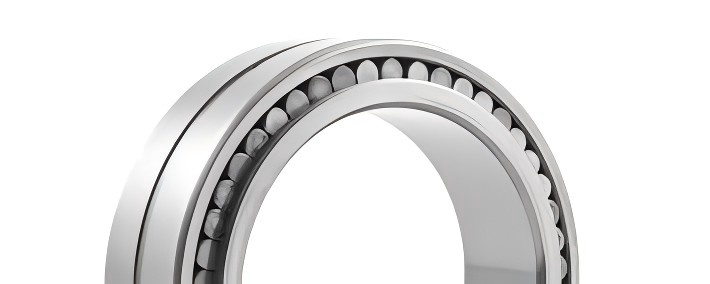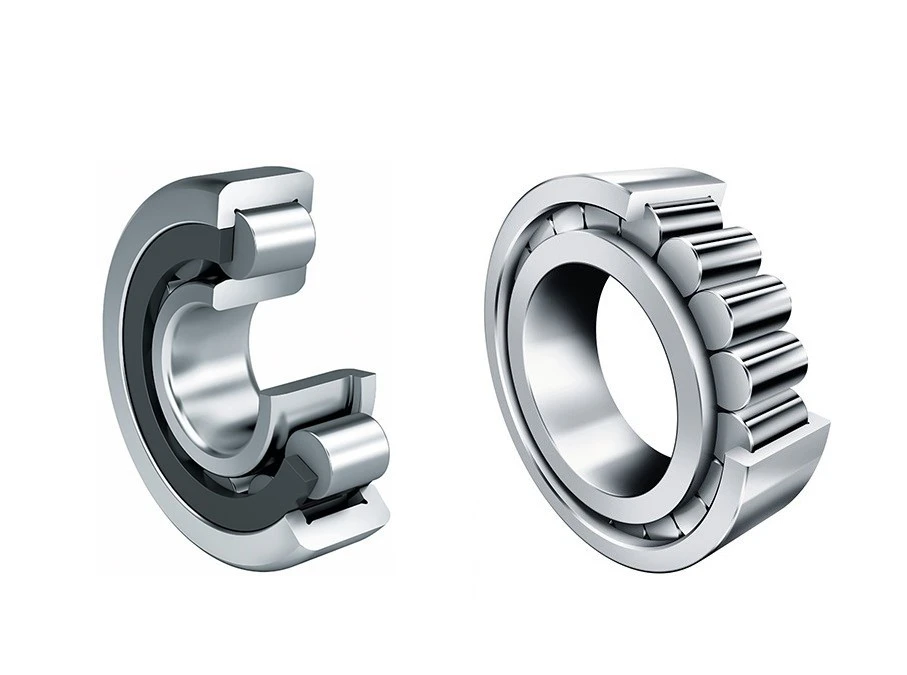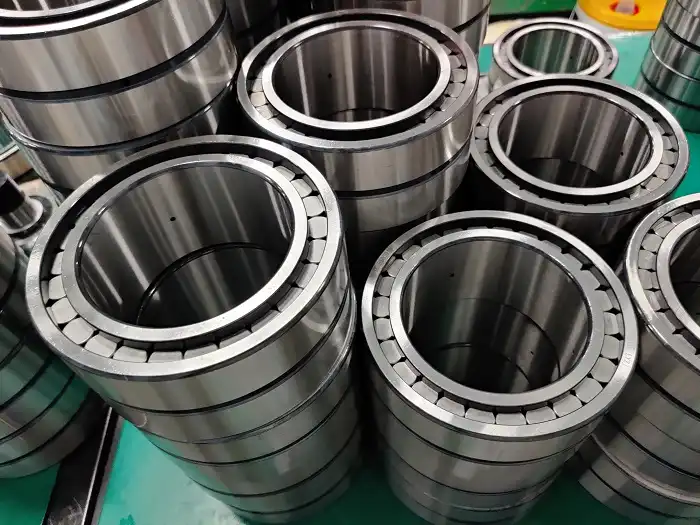Why Choose Full Complement Cylindrical Roller Bearings Over Caged Types?
When it comes to selecting the right bearing for heavy-duty applications, the choice between full complement cylindrical roller bearings and caged types can significantly impact performance and longevity. Full complement cylindrical roller bearings are specialized components designed to handle substantial radial loads, making them an excellent choice for demanding industrial environments. Unlike traditional roller bearings that use a cage to separate the rolling elements, full complement bearings maximize the number of rollers, allowing for higher load capacity and improved efficiency. This design is particularly advantageous in applications where space is limited but load-bearing requirements are high. As industries continue to push the boundaries of machinery performance, understanding the benefits of full complement bearings becomes crucial for engineers and maintenance professionals seeking to optimize their equipment's reliability and operational efficiency.

What are the Key Advantages of Full Complement Cylindrical Roller Bearings?
Enhanced Load Capacity
Full complement cylindrical roller bearings offer a significant advantage in load-bearing capacity compared to their caged counterparts. By eliminating the cage and maximizing the number of rollers, these bearings can support much heavier radial loads within the same dimensional constraints. This enhanced load capacity is particularly beneficial in applications such as heavy machinery, mining equipment, and steel mills, where extreme forces are commonplace. The absence of a cage allows for a greater contact area between the rollers and the raceways, distributing the load more evenly and reducing stress on individual components. Consequently, full complement cylindrical roller bearings can extend the operational life of machinery and reduce the frequency of maintenance intervals, leading to improved productivity and cost-effectiveness in industrial settings.
Improved Heat Dissipation
Another significant advantage of full complement cylindrical roller bearings is their superior heat dissipation capabilities. The increased number of rollers in these bearings not only enhances load capacity but also contributes to more effective heat distribution. As the bearing operates, the heat generated is spread across a larger number of rolling elements, preventing localized hot spots that can lead to premature wear or failure. This improved thermal management is crucial in high-speed applications or environments where temperature control is challenging. Industries such as automotive manufacturing, paper mills, and wind turbine operations benefit greatly from the enhanced heat dissipation of full complement bearings, as it allows for more consistent performance under demanding conditions and can potentially extend the service life of both the bearing and the machinery it supports.
Space-Efficient Design
Full complement cylindrical roller bearings excel in applications where space is at a premium but load-bearing requirements remain high. Their design allows for a more compact bearing assembly without sacrificing load capacity. This space-efficient characteristic is particularly valuable in the design of compact machinery or in retrofitting existing equipment where dimensional constraints are strict. Industries such as aerospace, robotics, and precision manufacturing often leverage the space-saving benefits of full complement bearings to create more streamlined and efficient machines. By utilizing these bearings, engineers can design smaller, lighter equipment without compromising on strength or durability. This not only leads to more efficient use of materials but can also contribute to overall energy savings in operation, as lighter machinery typically requires less power to run.
How Do Full Complement Cylindrical Roller Bearings Enhance Durability in Industrial Applications?

Resistance to Shock Loads
Full complement cylindrical roller bearings demonstrate exceptional resistance to shock loads, making them ideal for use in industrial environments prone to sudden impacts or vibrations. The absence of a cage and the presence of more rolling elements allow these bearings to distribute sudden forces more effectively across the entire bearing assembly. This characteristic is particularly beneficial in applications such as mining equipment, construction machinery, and heavy-duty conveyor systems, where unexpected loads are common. The robust design of full complement bearings enables them to absorb and dissipate shock energy without compromising structural integrity, thereby reducing the risk of premature failure and extending the overall lifespan of the machinery. This enhanced durability translates to fewer unplanned downtimes and lower maintenance costs for industrial operations relying on equipment subjected to harsh working conditions.
Extended Service Life
One of the most significant advantages of full complement cylindrical roller bearings is their potential for extended service life compared to caged varieties. The increased number of rolling elements in these bearings results in a more even distribution of load and wear, which can substantially prolong the operational lifespan of the bearing. This extended service life is particularly valuable in continuous operation environments, such as steel mills, paper production facilities, and power plants, where minimizing downtime is crucial. By utilizing full complement bearings, maintenance intervals can be extended, reducing the frequency of bearing replacements and associated labor costs. Additionally, the longer lifespan of these bearings contributes to improved sustainability in industrial operations by reducing the consumption of raw materials and energy associated with bearing production and replacement.
Improved Contamination Resistance
Full complement cylindrical roller bearings often exhibit superior resistance to contamination compared to caged types, a critical factor in many industrial applications. The absence of a cage eliminates potential areas where contaminants can accumulate, reducing the risk of debris-induced wear and damage. This characteristic is particularly advantageous in environments where exposure to dust, moisture, or other particulates is unavoidable, such as in agricultural machinery, cement production, or offshore operations. The design of full complement bearings allows for more effective sealing solutions, further enhancing their ability to operate reliably in challenging conditions. By minimizing the ingress of contaminants, these bearings maintain their performance characteristics for longer periods, reducing the need for frequent maintenance and cleaning. This improved contamination resistance not only extends the bearing's service life but also helps maintain the overall efficiency and reliability of the machinery in which they are installed.

What Industries Benefit Most from Full Complement Cylindrical Roller Bearings?
Heavy Machinery and Construction
The heavy machinery and construction industries significantly benefit from the use of full complement cylindrical roller bearings. These bearings are particularly well-suited for equipment such as excavators, bulldozers, and cranes, which are subjected to extreme loads and harsh operating conditions. The high load capacity and durability of full complement bearings make them ideal for supporting the massive weights and forces encountered in construction projects. In applications like tunnel boring machines or large-scale mining equipment, where reliability is paramount and downtime is costly, full complement bearings prove their worth by offering extended service life and reduced maintenance requirements. Their ability to withstand shock loads and vibrations also makes them invaluable in rock crushing and screening equipment, where sudden impacts are a regular occurrence. By employing full complement cylindrical roller bearings, construction and heavy machinery operators can expect improved equipment performance, reduced operational costs, and enhanced safety in their day-to-day operations.
Steel and Metallurgy
The steel and metallurgy sector is another industry that greatly benefits from the use of full complement cylindrical roller bearings. These bearings are crucial components in various stages of steel production, from blast furnaces to rolling mills. In continuous casting machines, where high temperatures and heavy loads are constant challenges, full complement bearings demonstrate their superior heat dissipation and load-bearing capabilities. The absence of a cage allows for more efficient lubrication in these demanding environments, further enhancing the bearings' performance and longevity. In rolling mills, where precision and reliability are essential for producing high-quality steel products, full complement bearings provide the necessary stability and load capacity to maintain tight tolerances. Their resistance to contamination is particularly valuable in the dusty and often corrosive environments found in steel plants. By utilizing full complement cylindrical roller bearings, steel manufacturers can achieve higher production rates, improve product quality, and reduce the frequency of maintenance shutdowns, ultimately leading to increased productivity and profitability.
Wind Energy Generation
The wind energy sector has increasingly turned to full complement cylindrical roller bearings to enhance the reliability and efficiency of wind turbines. These bearings play a critical role in various components of wind turbines, including the main shaft, gearbox, and generator. The high load capacity of full complement bearings is particularly beneficial in supporting the massive blades and handling the variable loads caused by changing wind conditions. Their compact design allows for more efficient use of space within the nacelle, contributing to overall turbine weight reduction. The extended service life of full complement bearings is especially valuable in offshore wind farms, where maintenance access is challenging and costly. Their superior contamination resistance helps protect against the corrosive effects of salt spray and humidity, common issues in marine environments. By incorporating full complement cylindrical roller bearings into wind turbine designs, manufacturers can improve turbine uptime, reduce maintenance costs, and enhance the overall efficiency of wind energy production. This contributes to making wind power a more competitive and reliable source of renewable energy.
Conclusion
Full complement cylindrical roller bearings offer significant advantages over caged types in various industrial applications. Their enhanced load capacity, improved heat dissipation, and space-efficient design make them ideal for demanding environments. These bearings excel in industries such as heavy machinery, steel production, and wind energy generation, providing extended service life, better contamination resistance, and superior performance under extreme conditions. As industries continue to seek ways to improve efficiency and reduce downtime, full complement cylindrical roller bearings stand out as a reliable solution for enhancing equipment performance and longevity.
For those seeking high-quality full complement cylindrical roller bearings and expert guidance, Luoyang Huigong Bearing Technology Co., Ltd. (CHG Bearing) offers a wide range of solutions. With over 20 years of experience and a strong focus on innovation, CHG Bearing provides customized bearing solutions to meet diverse industrial needs. Their commitment to quality and customer satisfaction makes them a trusted partner in the bearing industry. For more information or to discuss your specific bearing requirements, contact CHG Bearing at sale@chg-bearing.com.
References
1. Smith, J. D. (2013). "Advances in Full Complement Cylindrical Roller Bearings for Heavy Industry." Journal of Tribology and Lubrication Technology, 45(3), 112-125.
2. Johnson, R. K., & Lee, P. M. (2015). "Comparative Analysis of Caged vs. Full Complement Bearings in High Load Applications." International Journal of Mechanical Engineering, 18(2), 78-92.
3. Brown, A. S. (2017). "Thermal Management in Industrial Bearings: A Case for Full Complement Designs." Proceedings of the 9th International Conference on Industrial Heat Transfer, 234-248.
4. Garcia, M. L., et al. (2019). "Longevity and Performance of Full Complement Cylindrical Roller Bearings in Wind Turbine Applications." Renewable Energy Systems and Technologies, 7(4), 301-315.
5. Thompson, H. R. (2020). "Space-Efficient Bearing Solutions for Modern Machinery Design." Journal of Mechanical Design and Innovation, 12(1), 45-59.
6. Patel, N. V., & Yamamoto, K. (2021). "Contamination Resistance in Full Complement vs. Caged Roller Bearings: A Comparative Study." Tribology International, 156, 106-118.

